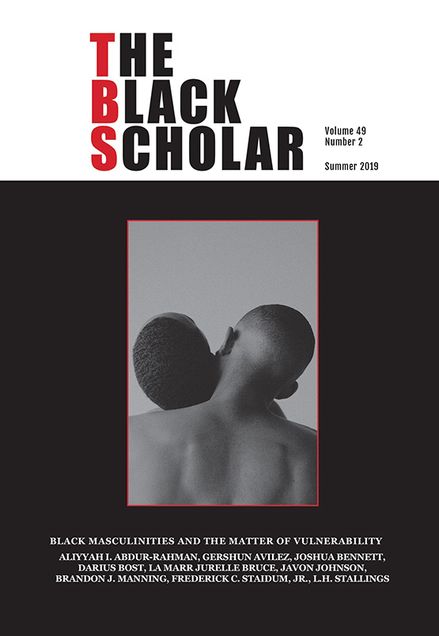49.2, Black Masculinities and the Matter of Vulnerability
 This special issue contributes to studies of Black masculinities by centering the matter of vulnerability. It expands concerns about vulnerability in black masculinities studies from more spectacular forms of violence to consider the interior lives of Black masculine subjects and more quotidian and privatized forms of violence and violation. The essays explore a range of performances and expressions—(non)masculinity, feminine-aligned masculinity, mama’s boys, interspecies imaginings, and bereavement—to ask how Black masculinities are fashioned in an anti-Black, anti-queer, and gender-normative world. Through historical and contemporary examples that engage the fields of visual culture, animal, literary, performance, Black feminist, and Black queer studies, these contributions consider how masculinity is made or unmade by blackness and through the ubiquitous threat of gendered forms of anti-Black violence.
This special issue contributes to studies of Black masculinities by centering the matter of vulnerability. It expands concerns about vulnerability in black masculinities studies from more spectacular forms of violence to consider the interior lives of Black masculine subjects and more quotidian and privatized forms of violence and violation. The essays explore a range of performances and expressions—(non)masculinity, feminine-aligned masculinity, mama’s boys, interspecies imaginings, and bereavement—to ask how Black masculinities are fashioned in an anti-Black, anti-queer, and gender-normative world. Through historical and contemporary examples that engage the fields of visual culture, animal, literary, performance, Black feminist, and Black queer studies, these contributions consider how masculinity is made or unmade by blackness and through the ubiquitous threat of gendered forms of anti-Black violence.
The essays explore a range of topics: proslavery and abolitionist discourse as a way to understand Black masculine vulnerability without likening it to feminization; poetic and filmic representations of black male life that radically refigure the animalization of Black people as a site of liberatory possibility; the association between Black masculinity and the Black maternal; vulnerability and intimacy in times and spaces of bereavement; and queer contingency—simultaneous freedom and risk that emerge from Black male gender subversion. Together, these contributions expose histories of anti-Black, misogynist, and homophobic violence, while imagining alternative modes of masculinity, blackness, and (post)human agency and subjectivity.
The essays in this volume are appropriate for specialists and graduate students, as well as the general public. The special issue will be of interest those engaged in the study of Black masculinities in the wake of Black feminist, queer studies, and trans studies and politics. It will be useful to individuals and groups interested in thinking critically about Black masculinities in the era of #BlackLivesMatter and #MeToo movements. We also hope the essays in this collection will reinvigorate the field of Black masculinities studies, and push both public and scholarly discourse about Black masculinities beyond simple dichotomies of toxic masculinity or Black male victimization.
– Darius Bost, La Marr Jurelle Bruce, and Brandon J. Manning